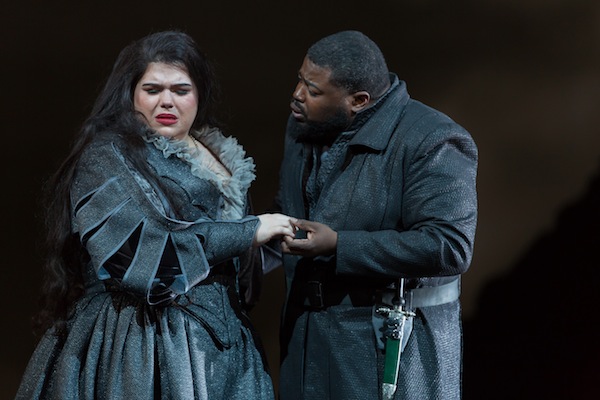Strong singing and conducting make for a gripping “Don Carlo” at Washington National Opera

Leah Crocetto and Russell Thomas in Verdi’s “Don Carlo” at Washington National Opera. Photo: Scott Suchman
Washington National Opera’s production of Verdi’s Don Carlo is something to be savored, at least by the ears. Music director Philippe Auguin, for his last stint at the podium in that position, presided over a luscious reading of this magnificent score Saturday night in the Kennedy Center Opera House.
On stage a cast with no real weak links produced that rarest of operatic evenings: a gripping drama, no matter how ridiculous it reads in the synopsis, revealed in singing scaled perfectly to the emotional rise and fall of the story.
The greatest achievements came from the two leading women characters, both in competition for the affections of King Philip II as well as his son, Don Carlo. Mezzo-soprano Jamie Barton’s Eboli seemed to come out on top before the single intermission. Barton used her brazen chest voice, elemental in power, to dominate the stage with arrogant spite, as steady and beautiful in ensembles as in solos. Her tone flagged just slightly at the end of her showpiece aria in the second half, and only at the top of her range.
As Elisabetta, Leah Crocetto seemed to keep her vocal strength in reserve a bit in the first half, meaning that in the marathon she had the strong finish. Crocetto’s soprano, turning more towards the spinto category, had just the right combination of ethereal beauty and spine-tingling power; the former was manifest in both the sad first act aria and the gorgeous duet with Carlo in the last act,and the latter at the top of ensembles. Her reluctant queen was an ideal combination of saintly reserve and elegant authority.
Eric Owens has been appearing in Washington for two decades now, and his bass-baritone has lost some of its potency at both ends. Even so, his Philip II glowered and ruminated in moving ways, making his meditative scene at the start of the second half dramatically compelling.
Tenor Russell Thomas made an imposing company debut in the title role, impressing with the suavity of his pianissimo tone as much as with the power and consistency of his voice.
Thomas molded his voice to blend perfectly with both Crocetto’s Elisabetta and the expansive Rodrigo, Marquis of Posa, of baritone Quinn Kelsey (another striking company debut). The first act duet between Rodrigo and Carlo becomes the sign of their devoted friendship–in some stagings, more than friendship–the tune reappearing at significant points. Kelsey excelled in forceful moments, the soft side of his voice losing some of its vigor, and he was sometimes wayward from Auguin’s careful beat.
Bass Andrea Silvestrelli made a menacing Grand Inquisitor, the role that bears most of Verdi’s acidic anti-clerical attitudes, although a prominent vibrato wobble destabilized some top notes. Peter Volpe, who will sing Philip II in the single B cast performance on March 16, was an opulent presence as the Friar. Members of the Domingo-Cafritz Young Artist program had noteworthy comprimario performances, including Allegra De Vita as a saucy Tebaldo and Leah Hawkins as the radiant Celestial Voice.
The often-revised opera was presented in the shortened four-act Italian version. Tim Albery’s minimalist, half-modernized production is effective but slight. The first half’s set is an octagonal baptistery structure turned on its side (set designs by Andrew Lieberman), with the dome on the back wall facing the audience. If this is not enough to show that the church’s power has knocked the world off its moorings he has also raked the floor at funhouse angles.
The same set serves for the second half, with a backdrop screen showing clouds and a rise of ashen earth to one side. More lavish and specific sets, in the traditional style of grand opera, would have further heightened the drama, already pointed by the singers and orchestra. The costumes, designed by Constance Hoffman, ranged from gray to black, with leather predominating. This left the most dramatic scenes visually rather plain, none more than the auto-da-fe at the end of the first half, which ended with the condemned heretics seated comfortably in chairs.
Auguin’s leadership at the podium is what glued all of these elements together in such a convincing whole. His beat is always secure and clean, even with the occasional lapse from some singers and the brilliantly drilled WNO Chorus. Beautiful sounds came from the pit all night, especially the crucial solos for the horn section and pleading oboe and English horn, as well as from the brass in the off-stage banda (the last perhaps too distantly placed). Singers never had to strain, as Auguin crafted the envelope of sound to embrace but never overwhelm them.
Don Carlo runs through March 17. A different cast will feature in the March 16 performance. kennedy-center.org; 202-467-4600.

Posted Mar 06, 2018 at 11:19 am by Laura Youens
Sounds like a production to be heard rather than seen!